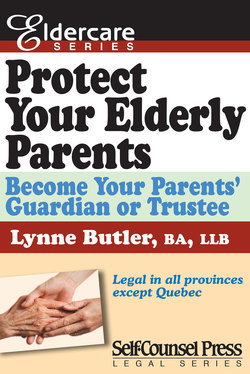Читать книгу Protect Your Elderly Parents - Lynne Butler - Страница 7
На сайте Литреса книга снята с продажи.
1.1 Guardianship
ОглавлениеA guardian deals with decisions of a personal nature. This includes health-related decisions such as whether the dependent adult should have a particular surgical operation, take specific medication, or see a doctor. It usually also extends to other personal decisions such as where the dependent adult will live and even small, day-to-day decisions such as what the dependent adult will eat and what he or she will wear. The guardian is the person who would make those decisions on behalf of the dependent adult. As each individual dependent adult is different, so will the decisions needed to be made by each guardian. The general idea is to assist the dependent adult where necessary while allowing him or her to live as independently as possible.
A guardian does not make decisions relating to money, bills, investments, finances, or property. A guardian has no authority to sell or rent a dependent adult’s house, pay his or her bills, receive an inheritance on his or her behalf, or invest the dependent person’s savings.
The Guardianship and Trusteeship Act of the Northwest Territories, though it only applies to Northwest Territories and Nunavut, contains valuable guidance for anyone who is going to act as a guardian, regardless of where they live. Similar guidelines are expressed in the laws of other parts of Canada as well.
The following is a paraphrased summary of what the Northwest Territories’ act says. In deciding what decision is in the best interests of the dependent adult, the guardian shall take the following into consideration:
• If the guardian knows of a wish or instruction that was expressed by the dependent adult when the dependent adult was still mentally capable, the guardian shall make decisions in accordance with that wish or instruction.
• If the dependent adult’s current wishes can be determined, then the guardian shall make decisions in accordance with the dependent adult’s current wishes.
• A guardian shall encourage the dependent adult to participate, to the best of his or her ability, in the guardian’s decisions.
• A guardian shall foster regular personal contact between the dependent adult and his or her supportive friends and family.
• A guardian shall consult from time to time with the dependent adult’s supportive friends and family as well as the dependent adult’s caregivers.
• A guardian shall foster the dependent adult’s independence as much as possible.
Guardian is the term used in most Canadian provinces and territories, but some provinces call a court-appointed guardian by a different name. See Table 2 for the names used in each province and territory.
